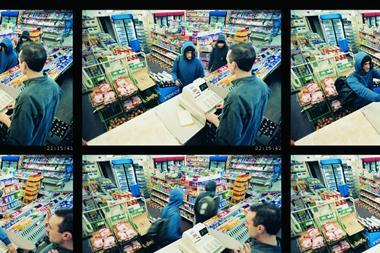Pest control is an area where retailers cannot afford to take any chances, says Andrew Don
Pests are a definite no-no when it comes to convenience retailing. You can find yourself in court, risk your own and your customers' health, and destroy the reputation that you have spent years building up in one fell swoop. Pay no heed to the saying that all publicity is good publicity. When it comes to furry creatures leaving faeces in your flour, prosecution will bring the last sort of publicity your business needs.
Surrey-based pest control company Cleankill, which lists convenience store operators among its clients, believes all responsible business owners need pest-control contracts. "It is rare now for us to be called into a convenience store because they have a problem and do not have a contract in place," says managing director Paul Bates.
Tates stores have certainly taken a pro-active approach. Stuart Adkin, retail operations director of Tates, says the group's 214 stores get visits from pest control contractors two to six times a year as a preventative measure. "We then react based on what they find or don't find," he says.
However, the message is still not getting through to a number of independents, some of whom have found themselves in court in recent months. Ghulam Naz was fined £5,000 and ordered to pay £900 prosecution costs at Birmingham Magistrates Court this summer when mouse droppings were found in boxes containing ready-to-eat sweets at his Save On Mini Market store in Small Heath. Although he had discovered the issue before environmental health officers became involved, he had called on a friend to treat the problem, rather than involving professional pest controllers.
Meanwhile, Shabir Hussain, owner of One Nation Food and Wine in Maida Vale, West London, was given a community service order, £1,000 fine and forced to pay costs of £3,517 in October this year after Westminster environmental health officers found many of its ready-to-eat products contaminated with rodent hair.
"In London in particular, foxes rip bin bags apart and carry bones and fruit out of the bags and leave them in hidden areas where they start rotting. The rats find them and start infesting the shops. When you consider that rats breed on average five times a year and have seven or eight babies per litter, their spread can become rapid."
The flats and houses near Alan Fincham's Londis stores in Attleborough and Banham, Norfolk, get fortnightly collections, so he isn't taking any risks. He has taken out a contract with Rentokil costing about £400 a year as a precaution against pest problems. "There could be an issue, especially if we've got bins being turned over," he says. "I've often had to tidy the bins early in the morning."
He says Rentokil lays bait, carries out regular checks and identifies whether there is an increase in pest activity in the area.
Of course, rodents and foxes are not the only pests to watch out for. Flour moths, also known as meal moths, can be found in flour, whole grains, cereal, dried fruits, nuts, seeds and powdered milk. Bates says convenience stores that have large bags of rice delivered in hessian bags can be prone to rice weevil and flour moths, and even cockroaches which are able to convert anything animal or vegetable into food and which carry food-poisoning germs on their bodies. Bates advises always checking deliveries.
A particularly vulnerable area is the store room, which might not be as big as an owner would like. Goods stacked on the floor can lead to a build up of dirt in hidden places. Fruit and vegetables are vulnerable to attacks by mice and rats, who are especially attracted to melons because of their moisture content.
Be it a furry foe or a bug-eyed beastie, taking correct precautions and ensuring that you have regular pest control checks can avoid these destructive creatures ruining your produce and your bank balance. After all, an average quarterly charge of about £140 for pest control maintenance hardly compares with the hefty fines environmental health can deliver, never mind the immeasurable damage that a pest problem can do to your reputation.
What to do if things go wrong
*If you see signs of a pest infestation, call a pest contractor immediately
*If you think any equipment, surfaces or utensils have been touched by pests, they should be washed, disinfected and dried to stop harmful bacteria from spreading
*If you think food has been touched by pests in any way, throw it away.
Signs of pests
*Rats and mice: small footprints in dust, droppings, holes in walls and doors, nests, gnawed packaging, grease or smear marks, urine stains
*Flies and flying insects: dead insects, webbing, nests, droning or buzzing, maggots
*Cockroaches: eggs, moulted skins, droppings
*Ants: small piles of sand or soil Birds: feathers, droppings, nests, noise
*Beetles and weevils: moving insects, particularly in dry food, small maggots.
Pests are a definite no-no when it comes to convenience retailing. You can find yourself in court, risk your own and your customers' health, and destroy the reputation that you have spent years building up in one fell swoop. Pay no heed to the saying that all publicity is good publicity. When it comes to furry creatures leaving faeces in your flour, prosecution will bring the last sort of publicity your business needs.
Surrey-based pest control company Cleankill, which lists convenience store operators among its clients, believes all responsible business owners need pest-control contracts. "It is rare now for us to be called into a convenience store because they have a problem and do not have a contract in place," says managing director Paul Bates.
Tates stores have certainly taken a pro-active approach. Stuart Adkin, retail operations director of Tates, says the group's 214 stores get visits from pest control contractors two to six times a year as a preventative measure. "We then react based on what they find or don't find," he says.
However, the message is still not getting through to a number of independents, some of whom have found themselves in court in recent months. Ghulam Naz was fined £5,000 and ordered to pay £900 prosecution costs at Birmingham Magistrates Court this summer when mouse droppings were found in boxes containing ready-to-eat sweets at his Save On Mini Market store in Small Heath. Although he had discovered the issue before environmental health officers became involved, he had called on a friend to treat the problem, rather than involving professional pest controllers.
Meanwhile, Shabir Hussain, owner of One Nation Food and Wine in Maida Vale, West London, was given a community service order, £1,000 fine and forced to pay costs of £3,517 in October this year after Westminster environmental health officers found many of its ready-to-eat products contaminated with rodent hair.
How to prevent pest problems:
*Proof the bottom of doors so rodents can't get under
*Make sure the perimeter is secure
*Repair broken air vents and ensure all service pipes have seals
*Check under shelving on the shop floor and in the store room to ensure there are no broken packets
*Raise stock off the ground on shelving
*Have a cleaning plan and make sure staff sweep and mop daily and pull out fridges to expose areas where rodents can hide
*Dispose of any stock if you suspect it has been contaminated
*Keep an eye out for droppings and take immediate action
*Be wary of empty premises next door because an infestation could spread
Source: Cleankill
Even if retailers are disposing of their waste in the proper manner, they may still be at risk of pest infestations due to an increasing number of councils making their residential bin collections fortnightly, Bates points out. "If you have a row of shops, they will have houses and flats around them and people leave rubbish bags in the back alleys rather than in enclosed bins," he explains.*Proof the bottom of doors so rodents can't get under
*Make sure the perimeter is secure
*Repair broken air vents and ensure all service pipes have seals
*Check under shelving on the shop floor and in the store room to ensure there are no broken packets
*Raise stock off the ground on shelving
*Have a cleaning plan and make sure staff sweep and mop daily and pull out fridges to expose areas where rodents can hide
*Dispose of any stock if you suspect it has been contaminated
*Keep an eye out for droppings and take immediate action
*Be wary of empty premises next door because an infestation could spread
Source: Cleankill
"In London in particular, foxes rip bin bags apart and carry bones and fruit out of the bags and leave them in hidden areas where they start rotting. The rats find them and start infesting the shops. When you consider that rats breed on average five times a year and have seven or eight babies per litter, their spread can become rapid."
The flats and houses near Alan Fincham's Londis stores in Attleborough and Banham, Norfolk, get fortnightly collections, so he isn't taking any risks. He has taken out a contract with Rentokil costing about £400 a year as a precaution against pest problems. "There could be an issue, especially if we've got bins being turned over," he says. "I've often had to tidy the bins early in the morning."
He says Rentokil lays bait, carries out regular checks and identifies whether there is an increase in pest activity in the area.
Of course, rodents and foxes are not the only pests to watch out for. Flour moths, also known as meal moths, can be found in flour, whole grains, cereal, dried fruits, nuts, seeds and powdered milk. Bates says convenience stores that have large bags of rice delivered in hessian bags can be prone to rice weevil and flour moths, and even cockroaches which are able to convert anything animal or vegetable into food and which carry food-poisoning germs on their bodies. Bates advises always checking deliveries.
A particularly vulnerable area is the store room, which might not be as big as an owner would like. Goods stacked on the floor can lead to a build up of dirt in hidden places. Fruit and vegetables are vulnerable to attacks by mice and rats, who are especially attracted to melons because of their moisture content.
Be it a furry foe or a bug-eyed beastie, taking correct precautions and ensuring that you have regular pest control checks can avoid these destructive creatures ruining your produce and your bank balance. After all, an average quarterly charge of about £140 for pest control maintenance hardly compares with the hefty fines environmental health can deliver, never mind the immeasurable damage that a pest problem can do to your reputation.
What to do if things go wrong
*If you see signs of a pest infestation, call a pest contractor immediately
*If you think any equipment, surfaces or utensils have been touched by pests, they should be washed, disinfected and dried to stop harmful bacteria from spreading
*If you think food has been touched by pests in any way, throw it away.
Signs of pests
*Rats and mice: small footprints in dust, droppings, holes in walls and doors, nests, gnawed packaging, grease or smear marks, urine stains
*Flies and flying insects: dead insects, webbing, nests, droning or buzzing, maggots
*Cockroaches: eggs, moulted skins, droppings
*Ants: small piles of sand or soil Birds: feathers, droppings, nests, noise
*Beetles and weevils: moving insects, particularly in dry food, small maggots.


























2 Readers' comments